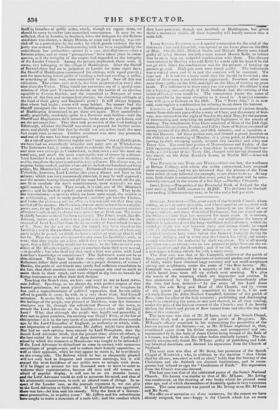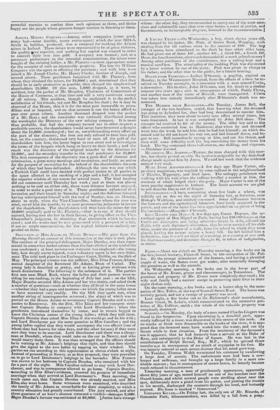as 11111011 care and conned with as much intents le
'as are those of our outgo, noisier, and more diversified Parliament, has just closed one of the lite,i;'sZ. S,'41,i;01S drat Las occurred for many years. It is curious, while cvs:ere-awe without the Church of our neighbours the heresy of Reform is eezLeriee desV11 the long-established ;tethered creed, within its secret] P: .,:acts the war between fixity and change should he waged. so ciiii lent results. The delinquencies of no fewer than four la-retied leediren have come before the General Assembly during its Reform is eezLeriee desV11 the long-established ;tethered creed, within its secret] P: .,:acts the war between fixity and change should he waged. so ciiii lent results. The delinquencies of no fewer than four la-retied leediren have come before the General Assembly during its ee. clays' sittings; and in every case the Church has and unani- nomsly vindicated its authwity by their expulsion. We shall merely put those cases on record,—we do not pretend to judge between the ex- pelled menders and the Assembly ; and if we did, we should not deem a newspaper a fitting. vehicle for such a controversy.
The first case was that of Mr. Campbell, minister of the parish of P.ow, accused of holding the doctrines of universal pardon and assurance of faith, which have obtained large currency and not small acceptance
among our neighbours, under the name of "the ROW heresy." Mr. Campbell was condemned by a majority of 109 to 6, after a debate which lasted from noon till six o'clock next morning. We give the words of the sentence, which are impressive and curious. It was pronounced by the Moderator [president] immediately after the vote haul been declared—" In the name of the Lord Jesus Christ, the sole King and Head of this Church, and by virtue of the power and authority committed by him to it, I do now
solemnly depose Mr. John Macleod Campbell, minister of the parish of Row, from the office of the holy ministry ; prohibiting and discharging Lim front exercising the same, or any part thereof, in all time coining,
under the pads of the highest censure of the Church: and I do hereby declare the church and pariah of Row vacant from and after the day and date of this sentence."
The next case was that of Mr. MeLean, late of the Scotch Chapel, London Wall, and a presentee of the parish of Dregitorn. Mr. M`Lean's offence consisted in his maintaining the peccability of the Juneau nature of the Saviour,—or, as Mr. M‘Lean explained it, that, considered apart from his divine nature, and unsupported and un- regenerated by it, the body of Jesus Christ being formed of the flesh of a woman, was liable to sin like other bodies similarly formed. The As- sembly unanimously found Mr. M‘Lean guilty of publishing and hold- ing heretical doctrines, and decreed his separation from the Church of Scotland.
The next case was that of Mr. Scott, late presentee of the Scotch Chapel of Woolwich ; who, in addition to the doctrine " that Christ died for all MOD, non-elect as well as elect," holds that the Sunday of the Christians and the Sabbath are distinct institutions, and in conse- quence had refused to sign the " Confession of Faith." His separation from the Church was also decreed.
The last case was that of the celebrated pastor of the Scotch National Church. His heresy was similar to that of Mr. 11PLean. Mr. Irving was condemned, on the showing of two books which he printed some time ago, and of which the members of Assembly spoke in very irreverent terms. The same sentence was passed on Mr. Irving as on Mr. M`Lean and Mr. Scott. We offer no observation on these sentences, for the reason we have already assigned, but one—happy is the Church which has no more
powerful enemies to combat than such opinions as these, and thrice .happy are the people whose greatest danger consists in listening to them.



























 Previous page
Previous page